 148 citations,
February 2005 in “Autoimmunity Reviews”
148 citations,
February 2005 in “Autoimmunity Reviews” Most people with systemic lupus erythematosus have skin problems, and skin symptoms are often the first sign of the disease.
 68 citations,
May 2021 in “Endocrine”
68 citations,
May 2021 in “Endocrine” People with diabetes or obesity should manage their conditions carefully as they have a higher risk of severe COVID-19.
[object Object]  67 citations,
December 2019 in “PloS one”
67 citations,
December 2019 in “PloS one” Beta-caryophyllene helps improve wound healing in mice, especially in females.
 52 citations,
October 2004 in “Veterinary dermatology”
52 citations,
October 2004 in “Veterinary dermatology” Melatonin and mitotane treatment led to hair re-growth in 62% of dogs with Alopecia X, but this was not always linked to normal hormone levels.
 47 citations,
June 2011 in “Movement Disorders”
47 citations,
June 2011 in “Movement Disorders” The LRRK2-G2019S mutation in Parkinson's disease has a lifetime penetrance of 25-35%, and finasteride may help reduce symptoms in adult male Tourette syndrome patients.
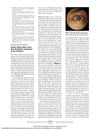 31 citations,
October 2012 in “Archives of ophthalmology”
31 citations,
October 2012 in “Archives of ophthalmology” Laser hair reduction near the eyebrows can cause serious eye injuries even with safety measures.
 31 citations,
June 2011 in “Movement Disorders”
31 citations,
June 2011 in “Movement Disorders” The document describes a woman with familial Parkinson's disease due to a genetic mutation, showing severe symptoms and poor response to treatment, and suggests finasteride may help reduce symptoms in Tourette syndrome.
 26 citations,
November 2009 in “Journal of Endocrinological Investigation”
26 citations,
November 2009 in “Journal of Endocrinological Investigation” Certain gene variations are not a major cause of male infertility in Nigerian men.
 20 citations,
October 2018 in “Aesthetic Plastic Surgery”
20 citations,
October 2018 in “Aesthetic Plastic Surgery” PRP shows promise for improving facial wrinkles, skin elasticity, and hair growth, but more research is needed to standardize its use and understand its effects.
 20 citations,
August 2016 in “International Journal of Cancer”
20 citations,
August 2016 in “International Journal of Cancer” Men with male pattern baldness have a higher risk of certain skin cancers, especially on the scalp.
 17 citations,
September 2017 in “Journal of Cosmetic Dermatology”
17 citations,
September 2017 in “Journal of Cosmetic Dermatology” Women with PCOS in North China often have hirsutism and acne, with hirsutism linked to metabolic issues.
 16 citations,
September 2019 in “Aesthetic Plastic Surgery”
16 citations,
September 2019 in “Aesthetic Plastic Surgery” Platelet-rich plasma therapy helps improve atrophic acne scars.
 14 citations,
December 2017 in “Journal of Bone and Mineral Metabolism”
14 citations,
December 2017 in “Journal of Bone and Mineral Metabolism” Women with polycystic ovary syndrome have a higher risk of certain fractures.
 13 citations,
August 2020 in “Journal of Laparoendoscopic & Advanced Surgical Techniques”
13 citations,
August 2020 in “Journal of Laparoendoscopic & Advanced Surgical Techniques” Biotin supplements are generally ineffective in preventing hair loss after sleeve gastrectomy.
[object Object]  13 citations,
October 2011 in “Clinical Obstetrics and Gynecology”
13 citations,
October 2011 in “Clinical Obstetrics and Gynecology” Women with PCOS-related infertility can often conceive with treatments like clomiphene and metformin, but managing pregnancy complications is important.
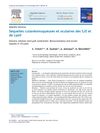 13 citations,
December 2010 in “Annales de Dermatologie et de Vénéréologie”
13 citations,
December 2010 in “Annales de Dermatologie et de Vénéréologie” The conclusion is that skin, mucous, and eye problems after Stevens-Johnson syndrome and Lyell syndrome significantly affect patients' lives, highlighting the need for comprehensive care and eye check-ups.
 13 citations,
January 1999 in “Postgraduate Medicine”
13 citations,
January 1999 in “Postgraduate Medicine” New drugs for rheumatoid arthritis show improvement but have side effects and are not a cure.
 11 citations,
February 2021 in “Journal of Cosmetic Dermatology”
11 citations,
February 2021 in “Journal of Cosmetic Dermatology” Oral tofacitinib helped regrow hair in over half of the patients with severe alopecia, but relapses and side effects were common.
 11 citations,
January 2017 in “Evidence-based Complementary and Alternative Medicine”
11 citations,
January 2017 in “Evidence-based Complementary and Alternative Medicine” DA-5512 effectively improves hair growth and health, performing better than minoxidil.
 8 citations,
July 2020 in “Journal of The American Academy of Dermatology”
8 citations,
July 2020 in “Journal of The American Academy of Dermatology” Patients with Lichen Planopilaris are more likely to have rosacea and skin cancer but less likely to have congestive heart failure, stroke, and glaucoma.
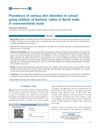 6 citations,
January 2013 in “Indian Journal of Paediatric Dermatology”
6 citations,
January 2013 in “Indian Journal of Paediatric Dermatology” About 69% of school children in Kashmir valley have skin disorders, with eczema and acne being the most common.
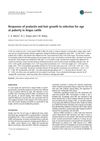 6 citations,
September 2010 in “Animal”
6 citations,
September 2010 in “Animal” Selecting Angus cattle for earlier puberty lowers prolactin levels but doesn't affect hair growth.
 5 citations,
May 2018 in “Statistics in Medicine”
5 citations,
May 2018 in “Statistics in Medicine” Model improves accuracy in predicting hair loss effects.
 4 citations,
May 2011 in “Movement Disorders”
4 citations,
May 2011 in “Movement Disorders” A woman's unique dementia was misdiagnosed, a genetic mutation increases Parkinson's risk with age, and finasteride may help with Tourette syndrome.
 3 citations,
June 2021 in “Cosmetics”
3 citations,
June 2021 in “Cosmetics” A mix of sulforaphane, L-menthol, and dexpanthenol could help increase hair growth and reduce hair loss.
 3 citations,
January 2018 in “İstanbul Kuzey Klinikleri”
3 citations,
January 2018 in “İstanbul Kuzey Klinikleri” Hair loss was found in 37.4% of surveyed rural high-school students in Eskisehir, Turkey, affecting their quality of life, especially in general health and mental well-being.
 2 citations,
August 2021 in “Journal of Turkish sleep medicine”
2 citations,
August 2021 in “Journal of Turkish sleep medicine” People with polycystic ovary syndrome are more likely to have poor sleep, restless legs syndrome, anxiety, and depression.
 2 citations,
December 2011 in “Annales de Dermatologie et de Vénéréologie”
2 citations,
December 2011 in “Annales de Dermatologie et de Vénéréologie” 2011 dermatological research found new skin aging markers, hair loss causes, skin defense mechanisms, and potential for new treatments.

Proretinal nanoparticles are a safe and effective way to deliver retinal to the skin.
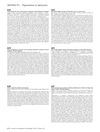 April 2016 in “Journal of Investigative Dermatology”
April 2016 in “Journal of Investigative Dermatology” Male pattern baldness is linked to a higher risk of certain skin cancers, especially on the scalp.






























